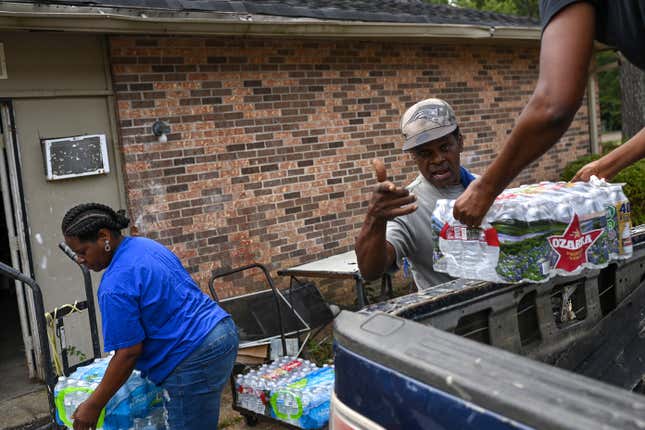
It’s been almost a week since the Mississippi state government officially lifted the boil water advisory in Jackson. But, for residents who’ve faced water contamination and frequent water shutoffs year after year, their fight for clean water is far from over.
Last Friday, Jackson residents filed a civil class action lawsuit against The City of Jackson, Jackson Mayor Chokwe A. Lumumba; Tony Yarber; Kishia Powell; Robert Miller; Jerriot Smash; Siemens Corporation; Siemens Industry, Inc.; and Trilogy Engineering Services LLC.
Several of the named defendants are former city officials.
The lawsuit alleges that officials and companies tasked with maintaining the water supply “neglected” the system for decades, culminating in the massive water shutdown in August of this year. But that even before the shutdown, water in Jackson, which is over 82% Black, was “not fit for human consumption.”
The City of Jackson declined to comment on pending litigation. And Siemens and Trilogy Engineering Services LLC did not respond to requests for comment by publication.
Priscilla Sterling, a grandmother and lead plaintiff in the case, has witnessed the crisis play out over the last three decades first-hand, according to the lawsuit.
For nearly 30 years, she says that she and her family drank, bathed, and brushed their teeth with water from the city’s tap, never once imagining that it could be poisonous.
That was until, the lawsuit alleges, she and her family began to show symptoms of lead poisoning.
According to the lawsuit, several of Sterling’s children have been diagnosed with lead poisoning. And Sterling herself suffers from frequent headaches.
And while one might imagine that this cluster of lead poisoning cases might warrant an investigation into potential lead in the pipes, according to the lawsuit, she hasn’t been able to get anyone to come to check her water for lead.
The more immediate water crisis this summer also had a huge impact on resident’s health and well-being, according to the lawsuit.
Raine Becker, a single-mother of a seven year-old with a terminal illness, was unable to properly clean her son’s feeding tube for weeks due to the water shutoff.
Becker, who works as a delivery driver and at a laundromat, says that she was also hit financially during the shutdown because local restaurants were all forced to close and that she was unable to wash clothes without running water.
The shutdown in August “is inexcusable,” says Robert Gibbs, an attorney for the plaintiffs. Gibbs says that although residents could have brought a lawsuit at anytime, the August shutdown was definitely a catalyst for addressing the much larger issues with the city’s water supply.
“That was the tipping point,” says Gibbs, who also lives in Jackson. “The entire purpose of this lawsuit is to get the system fixed once and for all.”
Gibbs sees what’s happening in this case as a much larger part of the struggle for civil rights that has often played out within the court system.
“I’m African American and I’ve seen how lawsuits have improved our access to voting, access to facilities, and transportation,” says Gibbs. “So, unfortunately, you have to use lawsuits sometimes when you can’t get your government officials to carry out their duties and responsibilities.”
Lawsuits like this one aren’t unusual, says Sacoby Wilson, a Professor of Environmental Justice at The University of Maryland School of Public Health.
In 2016, residents of Flint, Michigan, sued several parties allegedly responsible for lead contamination in the water. They were later awarded a $626.25 million settlement.
“There are many tools in the toolbox that we can use, including lawsuits to get action to address environmental injustice and to address environmental apartheid,” says Wilson. “Which is what we see in Jackson, Mississippi.”

